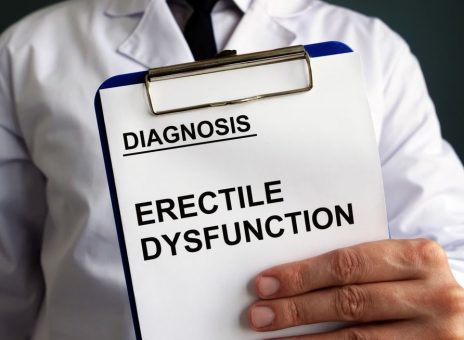ED means an increased risk of heart disease, independent of other risk factors.

Erectile dysfunction (ED) poses an increased cardiovascular risk independent of other risk factors such as cholesterol levels, smoking and high blood pressure, according to a new study published in the American Heart Association journal Circulation.
In the study, which followed more than 1,900 men aged 60 to 78 over four years, those who complained of ED were twice as likely to experience a heart attack, cardiac arrest, sudden cardiac death or fatal or non-fatal stroke.
According to the research team, ED is an important sign to help physicians assess cardiovascular risk in middle-aged men. The indicator was formally included in a risk assessment algorithm used by physicians in the United Kingdom last year to estimate a patient’s 10-year risk of an adverse cardiovascular event1.
According to research, erectile dysfunction (ED) – the inability to obtain or maintain an erection for satisfactory sexual intercourse – affects approximately 20% of men aged 20 years and older. Cardiovascular disease and ED share common risk factors, including obesity, hypertension, smoking, diabetes and metabolic syndrome (a syndrome that includes signs such as elevated blood glucose levels, high blood pressure and excess abdominal fat).
“Our results suggest that erectile dysfunction itself is a strong predictor of cardiovascular risk,” says study lead investigator Michael Blaha, MD, assistant professor of medicine at Johns Hopkins University School of Medicine in Baltimore, Maryland. Our findings suggest that physicians should more specifically screen men with erectile dysfunction independent of other cardiovascular risk factors and more aggressively target other risk factors such as hypertension and cholesterol levels.”
Although there has been little evidence of a link between ED and cardiovascular disease in recent years, the results of the latest study, the researchers said, provide the strongest evidence to date that sexual dysfunction is associated with increased cardiovascular risk.
During the four-year follow-up period, 115 fatal and nonfatal heart attacks, fatal and nonfatal strokes, cardiac arrests, and sudden cardiac deaths occurred; men who reported ED (6.3%) had higher rates of heart attacks, cardiac arrests, and strokes than those who did not report ED (2.6%). When the researchers adjusted the analysis to exclude the potential influence of other risk factors, the risk decreased slightly but was still significantly higher: men with ED were nearly twice as likely to have cardiovascular events as men without ED.
The participants in this study are part of the ongoing Multi-Ethnic Study of Atherosclerosis, which involves more than 6,000 men from different ethnic and racial groups in several U.S. cities.
Men seeking treatment or evaluation for ED should be referred for a comprehensive cardiovascular evaluation, Blaha said. In addition, the researchers say, men should be aware that ED increases the risk of cardiovascular disease.
The occurrence of ED should encourage men to have a comprehensive cardiovascular risk assessment with a preventive cardiologist,” Blaha notes. How many men first see a physician with ED as a chief complaint? This is an excellent opportunity to identify high-risk cases that would otherwise go undetected.”









